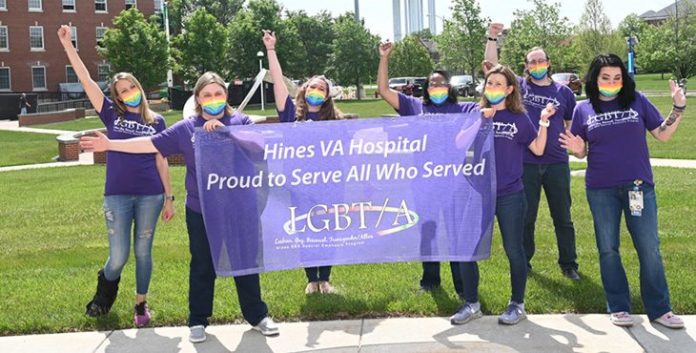This is part two in a two-part series about VA care for Veterans with Lesbian, Gay, Bisexual and Transgender (LGBT) and Related Identities. To see part one, visit https://blogs.va.gov/VAntage/89324/lgbt-veterans-describe-va-care-provide-advice-others/.
Lorry Luscri is one of VA’s many Lesbian, Gay, Bisexual and Transgender Veteran Care Coordinators (each VA medical center has one). She has a very straightforward message for Veterans with LGBT and related identities: “You do not have to be afraid to come to VA for care,” she said. “You are and have always been welcome here and should take advantage of all the great services available through VA for all Veterans.”
Evolving LGBT care
Even though VA did not have policies barring care for LGBT Veterans, the military did. Don’t Ask, Don’t Tell ended in 2011, and only recently have transgender service members been allowed to serve openly again.
“Sexuality and gender identity are important features of health,” said Michael Kauth, director of VA’s LGBT Health Program. “Everyone has a sexuality and gender identity, and LGBT Veterans have unique health needs that should be addressed.”
Road to improved care
Anna Craycraft has personally seen the changes. She’s an LGBT Veteran Care Coordinator at Oklahoma City VA. Craycraft said VA has continually updated policies to ensure equitable care for LGBT Veterans. This includes improved policies guaranteeing access to affirming treatment. Also, VA staff receive training on how to deliver high quality affirming care and services. This training helps address the unique health care needs of LGBT patients.
“The medical and mental health care that VHA provides to LGBT Veterans focuses on doing what VA does best: connecting providers for wrap-around care, thinking through all the minute details of access and equity, and putting methods and steps into place to make sure no one falls through the cracks,” she said.
Luscri said Hines VA started LGBT Veteran-specific programming in 2013 with focus groups. Staff asked LGBT Veterans about their experiences in receiving care and how they could improve.
“At that time there was a reluctance from many of our LGBT Veterans to participate,” Luscri said. “It was made clear from those who did that we had some work to do at Hines to create a more welcoming environment.”

Staff members at Hines VA Medical Center show their support for LGBT and Related Identities Veterans.
Care now
“Veteran Care Coordinators are central in improving LGBT care,” Kauth said. “The LGBT Veteran Care Coordinator’s role is to serve as a point-of-contact for LGBT Veterans who are seeking services or having difficulty accessing the services they need. These coordinators are instrumental in changing local culture to become more welcoming to LGBT Veterans.”
Craycraft said her fellow LGBT Veteran Care Coordinators love what they do.
“LGBT VCCs around the country are excited, passionate folks who are fully engaged in the work they are doing for LGBT Veterans,” she said.
Luscri said Hines VA provides several LGBT-specific services for Veterans. These include two support groups: Service and Pride and Transgender Veteran Support Group; they started in 2015 and 2016. LGBT Veterans can get care in both, including primary care clinics, community-based outpatient clinics, or the women’s health clinic.
Another important step is staff training. Hines, like all VA facilities, offers continuing education for staff. This training focuses on improving care and becoming better allies for LGBT Veterans.
“Ultimately, LGBT Veterans are looking for a patient-centered experience where they feel a connection to their health care team and other Veterans, like most Veterans seeking care at VA,” Luscri said.
Continuing to improve
Kauth said improving LGBT Veteran care is a constantly improving process. One early example is VA ensuring protection from discrimination. This protection also extends to family members and takes a broad definition of whom the patient or resident considers to be family.
“VA is increasing efforts across clinical programs to provide high quality clinical care in a culturally responsive, welcoming environment,” he said. “This care includes appropriate primary care and mental health services, support groups, gender counseling, hormone therapy, prosthetics, fertility evaluations, and evaluations for gender affirming surgeries, to name a few.”
Luscri said most of recommendations for improvement come from Veterans.
“The majority of the changes we have made at Hines came from recommendations made by our Veterans,” Luscri said. “Many of them are equally engaged in helping us to create and maintain a welcoming environment”
Better care helps others
Craycraft said many LGBT Veterans who experience good care offer support to the larger community in Oklahoma City. She said they want to return the favor to those around them in need. She recalled an Oklahoma City Veteran in his early 60’s who identified as gay and was in a long-term relationship with a male partner when he began attending support groups.
“At that time, he was living with chronic pain and using a walker,” she said. “He rarely left his house and was afraid to come out to his family, as he anticipated that they would not accept him or his partner. Since he began attending our support groups, he has begun attending weekly yoga, dramatically reduced his chronic pain and opioid use, come out to his family – who were all accepting – and married his long-time partner.”
Luscri said an important part of the relationship includes LGBT Veterans talking to their providers.
“It’s an important part of your health care to disclose your sexual orientation and gender identity, and VA works to make sure you feel safe to do so,” she said.

People walk in a pride parade in Illinois.
Expectations
Both Luscri and Craycraft said LGBT Veterans have a simple and reasonable expectation: receive the care they deserve.
“LGBT Veterans are some of the most grateful, flexible and motivated patients I’ve worked with in my time as a psychologist at Oklahoma City VA,” Craycraft said. “I fully expected these LGBT Veterans to experience some bitterness over the ways they’ve been excluded or discriminated against in the past. Instead, they express their thankfulness over and over for actions as simple as following up about care.”
She added much like any other social setting, LGBT Veterans want to be accepted like any other peer.
“LGBT Veterans simply want to be treated with the respect and dignity that they deserve,” she said. “That means that they want friendly, engaging conversation with non-LGBT Veterans as well. Essentially – treat LGBT Veterans just like you’d like to be treated.”
Luscri echoed that sentiment.
“Every Veteran has their own story and their own experiences, but you all share the common ground of being a Veteran,” she said. “Listen to your fellow Veterans, treat them with respect, and honor their experiences. All Veterans deserve respect and care, regardless of sexual orientation or gender identity.”
Resources for LGBT and Related Identities Veterans
Find an LGBT VCC at https://www.patientcare.va.gov/LGBT/VAFacilities.asp.
VA health care includes, among other services:
- Hormone therapy
- Substance use/alcohol treatment
- Tobacco use treatment
- Fertility evaluations
- Treatment and prevention of sexually transmitted infections/PrEP
- Intimate partner violence reduction and treatment of after-effects
- Heart health
- Cancer screening, prevention and treatment
- Suicide prevention programs
Learn about health risks and talking to a provider about sexual orientation identity and self-identified gender identity. The fact sheets and directives below include information to help Veterans. Expect your VHA provider to ask about your sexuality and gender identity to address your health care needs. VA provides training to providers to keep your conversations confidential. You can also ask that this information stays out of your medical record. Medically necessary information must go in your medical record, such as a medical diagnosis. Finding a provider you are comfortable with is essential to your health and wellness.
Support
Learn about the resources and support available for Veterans who have faced challenges related to coming out.








